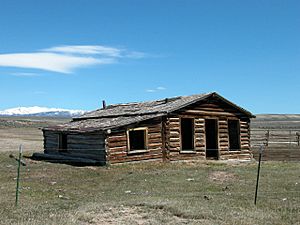Pacific Creek (Sweetwater County, Wyoming) facts for kids
Quick facts for kids Pacific Creek |
|
|---|---|
| Country | United States |
| State | Wyoming |
| Physical characteristics | |
| Main source | South Pass, Wyoming 42°19′44″N 108°52′13″W / 42.32889°N 108.87028°W |
| River mouth | Little Sandy Creek Farson, Wyoming 42°07′37″N 109°23′43″W / 42.12694°N 109.39528°W |
| Length | 36 mi (58 km) |
| Basin features | |
| Tributaries |
|
Pacific Creek is a stream located in the state of Wyoming, United States. It is about 36-mile (58 km) long. This creek starts on the western side of a place called South Pass. It then flows until it joins the Little Sandy Creek near Farson, Wyoming.
The name "Pacific" comes from its location. The stream begins just west of the Continental Divide. The Continental Divide is like a big imaginary line across North America. It separates the rivers that flow towards the Pacific Ocean from those that flow towards the Atlantic Ocean. So, Pacific Creek is on the "Pacific" side of this divide. Its waters eventually travel a long way to the Pacific Ocean. They do this by joining the Green River and then the Colorado River.
Pacific Creek was a very important landmark for pioneers. Many people traveled along the Oregon, California, and Mormon emigration trails. This creek was a key stop on their long journeys.
Contents
What is the Continental Divide?
The Continental Divide is a special ridge of mountains. It runs through North and South America. On one side, all the rain and snowmelt flow towards the Pacific Ocean. On the other side, the water flows towards the Atlantic Ocean or the Gulf of Mexico. Pacific Creek is unique because it starts right on the Pacific side of this divide.
Streams Joining Pacific Creek
Pacific Creek has other smaller streams that flow into it. These are called tributaries.
- Morrow Creek is one such tributary. It joins Pacific Creek from the left side. Morrow Creek starts in the desert Lucite Hills. These hills are also located on the Continental Divide. Morrow Creek flows for about 20 miles (32 km) before meeting Pacific Creek. It joins Pacific Creek about halfway through Pacific Creek's journey.
Pacific Creek's Role in History
The area around Pacific Creek has a rich history.
Discovery of South Pass
European-American traders first found South Pass in 1812. This pass was a much easier way to cross the Rocky Mountains. The first wagon trains, which were groups of wagons carrying pioneers, used this pass in 1832.
A Welcome Stop for Pioneers
Pacific Creek was the first water source pioneers found after leaving the Sweetwater River. They would leave the Sweetwater River at a place called Burnt Ranch, on the eastern side of South Pass. Many wagon trains would stop and rest at Pacific Springs. This spring is a major source of water for Pacific Creek. It was a perfect place for people and animals to get fresh water and recover.
The Journey Continues
After leaving Pacific Creek, the pioneers faced a challenging part of their journey. They entered a dry stretch of the trail. The next good water source was nearly 40 miles (64 km) away at the Green River. This made Pacific Creek an even more important stop for survival.
 | William M. Jackson |
 | Juan E. Gilbert |
 | Neil deGrasse Tyson |


